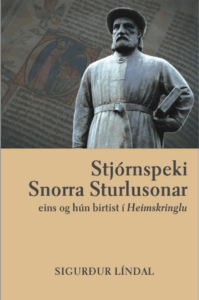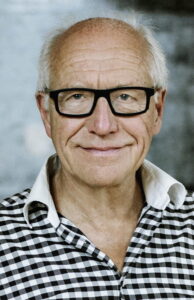Stjórnspeki Snorra Sturlusonar
The political philosophy of Snorri Sturluson
Þriðjudaginn 23. september 2025 kl. 16.30–18.00
Tuesday, September 23, 2025, at 16.30–18.00
Fyrirlestrasal Eddu (E-103) / Edda auditorium (E-103)
 Fundur Miðaldastofu í samstarfi við Hið íslenska bókmenntafélag og RSE, Rannsóknamiðstöð um samfélags- og efnahagsmál, í fyrirlestrasal Eddu 23. september 2025 (á dánardegi Snorra Sturlusonar) kl. 16.30–18.00. Tilefnið er útgáfa á riti prófessors Sigurðar Líndals, Stjórnspeki Snorra Sturlusonar eins og hún birtist í Heimskringlu, en það var upphaflega ritgerð í Úlfljóti 2007. Prófessor Ditlev Tamm mun ræða um réttarsögu Norðurlanda og framlag Sigurðar Líndals til hennar. Dr. Tom G. Palmer mun ræða um Snorra Sturluson frá sjónarmiði nútíma frjálshyggjumanns. Á eftir erindum þeirra verða umræður og á milli kl. 18 og 19 móttaka á staðnum fyrir fundargesti. Garðar Gíslason, fyrrv. hæstaréttardómari, stjórnar umræðum.
Fundur Miðaldastofu í samstarfi við Hið íslenska bókmenntafélag og RSE, Rannsóknamiðstöð um samfélags- og efnahagsmál, í fyrirlestrasal Eddu 23. september 2025 (á dánardegi Snorra Sturlusonar) kl. 16.30–18.00. Tilefnið er útgáfa á riti prófessors Sigurðar Líndals, Stjórnspeki Snorra Sturlusonar eins og hún birtist í Heimskringlu, en það var upphaflega ritgerð í Úlfljóti 2007. Prófessor Ditlev Tamm mun ræða um réttarsögu Norðurlanda og framlag Sigurðar Líndals til hennar. Dr. Tom G. Palmer mun ræða um Snorra Sturluson frá sjónarmiði nútíma frjálshyggjumanns. Á eftir erindum þeirra verða umræður og á milli kl. 18 og 19 móttaka á staðnum fyrir fundargesti. Garðar Gíslason, fyrrv. hæstaréttardómari, stjórnar umræðum.
A symposium hosted by the University of Iceland Centre for Medieval Studies (Miðaldastofa Háskóla Íslands) in collaboration with the Icelandic Literary Society (Hið íslenska bókmenntafélag) and The Centre for Social and Economic Research (Rannsóknamiðstöð um samfélags- og efnahagsmál, RSE) September 23, 2025 (Snorri Sturluson’s death day), in the auditorium in Edda (E-103) at 16.30-18.00. The symposium is to celebrate the re-issue of the late professor Sigurður Líndal’s work, Stjórnspeki Snorra Sturlusonar eins og hún birtist í Heimskringlu, which originally appeared in Úlfljótur in 2007. Professor Ditlev Tamm will discuss Scandinavian legal history and Sigurður Líndal’s contributions to the field. Tom G. Palmer will talk about Snorri Sturluson from the point of view of a modern libertarian. Their presentations will be followed by general discussion, and light refreshments will be served. Supreme Court Judge Emeritus Garðar Gíslason will chair the symposium.

Ditlev Tamm
With the law the land shall be built: King, people, law, and parliaments in the Nordic legal tradition
The Nordic countries today share democratic values and welfare-state mentality. Similarities between the Nordic countries are often stressed. However, different roads have led to present day conditions. Starting with the medieval period that interested Sigurður Líndal, I will reflect on the history of the main Nordic institutions of democracy, on Nordic attitudes towards absolutism and democratic traditions and the historical differences which mark the Nordic liberal legal tradition.
Ditlev Tamm (f. 1946) lauk doktorsprófum í lögfræði frá Kaupmannahafnarháskóla 1977 og í sagnfræði frá Háskólanum í Óðinsvéum 1984. Hann kenndi réttarsögu og aðrar greinar í lagadeild Kaupmannahafnarháskóla frá 1978 og er nú prófessor emeritus. Voru þeir Sigurður Líndal góðir kunningjar. Tamm situr í fulltrúaráði hugveitunnar CEPOS í Kaupmannahöfn Hann hefur birt fjölda bóka á fræðasviði sínu, meðal annars Rettens rødder – hvordan lov og ret har skabt Danmark (2022), Konseilspræsidenten – Jacob Brønnum Scavenius Estrup – 1825-1913 (1996) og Retsopgøret efter besættelsen (1984).
Ditlev Tamm (b. 1946) has a doctoral degree in law from the University of Copenhagen (1977) and in history from the University of Odense (1984). He taught legal history and related subjects in the University of Copenhagen Law School from 1978 and is now professor emeritus. The late Sigurður Líndal and he were good friends. Tamm is a member of the CEPOS think tank in Copenhagen. He has published several books, including Rettens rødder – hvordan lov og ret har skabt Danmark (2022), Konseilspræsidenten – Jacob Brønnum Scavenius Estrup – 1825-1913 (1996), and Retsopgøret efter besættelsen (1984).
Tom G. Palmer
Deliberation, Liberty, and Democracy: Comments on Sigurður Líndal’s contribution to the Understanding of Nordic Liberal Democracy

My comments will focus on an aspect of democratic liberty that Professor Sigurður Líndal touches on repeatedly, but which he does not make thematic. Sigurður Líndal stipulates, “When a society is called democratic, what is primarily meant is that political power is controlled by its people; and political institutions are thought to be democratic to the extent that they conduce to such an arrangement.” That is, as he notes, somewhat vague and could be improved by focusing on what is arguably the key to being conducive to the public weal and which was characteristic of the Nordic legal tradition, which is discussion and deliberation before public decision. Discussion and deliberation are found throughout the ancient traditions he discusses, obviously including the Nordic tradition, but also those of classical Athens and republican Rome. Democracy is, I submit, better understood as at base not merely an enumeration and tabulation of votes, such that, in Sigurður Líndal’s words, “political power is controlled by its people,” but rather, as Frank Knight phrased it, “government by discussion.” Discussion, rather than diktat, was a principle of Athenian and Roman republicanism, as well as of the Germanic societies.
I will also offer a wider appreciation of Sigurður Líndal’s interpretation of the role of Roman law, as in the essays before us he identifies as the key Roman law principle Quod principi placuit legis habet vigorem (what pleases the prince has the force of law) (derived from the preface to the Institutes of Justinian, that is, from the teaching manual), which became a mainstay of royal power and absolutism. He does not treat the competing principle that Quod omnes tangit ab omnibus approbetur (what touches all must be approved of by all), which became a principle of European constitutionalism and popular government, e.g., the slogan of the Polish-Lithuanian Republic of Nobles (Nic o nas bez nas, Nothing concerning us can be settled without us), Magna Carta’s no scutage or aid shall be imposed in our realm unless by the common counsel of the realm, and the American’s no taxation without representation, among other instances. The thorough resistance of Icelanders to the principle that the king is absolute and above the law is a testimony to an ancient principle that was only later, and through much struggle, revived and defended elsewhere.
Tom G. Palmer (f. 1956) lauk doktorsprófi í stjórnmálafræði frá Oxford-háskóla og er forstöðumaður alþjóðamála hjá Atlas Network, sambandi nær sex hundrað hugveitna um heim allan, þar á meðal CEPOS í Danmörku og RSE á Íslandi. Hann er áhugamaður um íslensk fornrit, hefur margsinnis komið til Íslands og var góður kunningi Sigurðar Líndals. Hann hefur gefið út eða ritstýrt fjölda bóka, þ. á m. safni ritgerða eftir hann sjálfan, Realizing Freedom: Libertarian Theory, History, and Practice (2009).
Tom G. Palmer (b. 1956) has a doctoral degree in political science from the University of Oxford and is director of international affairs at Atlas Network, a network of nearly six hundred think tanks worldwide, including CEPOS in Denmark and RSE in Iceland. An acquaintance of the late Sigurður Líndal, Palmer is interested in medieval Icelandic literature and he has visited Iceland multiple times. Palmer has published and edited many books, including a volume of his papers, Realizing Freedom: Libertarian Theory, History, and Practice (2009).
Málstofan verður haldin á ensku og er öllum opin. / The symposium will be conducted in English and is open to all.
—o—
